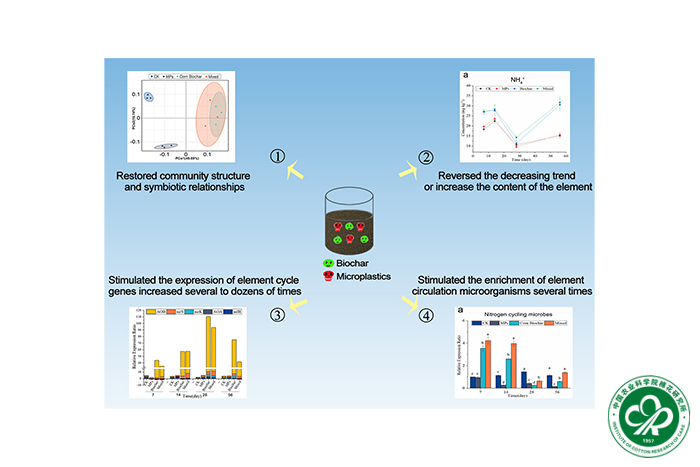- Location : Home» Newsroom
Exploring the potential of biochar for the remediation of microbial communities and element cycling in microplastic-contaminated soil
Recently, a team led by Researcher Cui Jinjie from the Cotton Research Institute of the Chinese Academy of Agricultural Sciences conducted a study on the role of cotton and corn straw biochar in remediating soil contaminated by microplastics from agricultural film residues. The study found that straw biochar played an important role in mitigating the adverse effects of microplastic contamination on soil microbial community structure and element cycling. The results of this research provide valuable insights for the management of agricultural film pollution. The related findings were published in the internationally renowned journal Chemosphere (IF=8.1) under the title “Exploring the potential of biochar for the remediation of microbial communities and element cycling in microplastic-contaminated soil.”
The detrimental effects of microplastics (MPs) on soil microbial and elemental raise significant environmental concerns. The potential of remediation with biochar to mitigate these negative impacts remains an open question. The remediation effects of biochar derived from corn and cotton straw on MPs concerning soil microorganisms and element cycling were investigated. Specifically, biochar induced substantial remediations in microbial community structure following MP exposure, restoring and fortifying the symbiotic network while exerting dominance over microbial community changes. A combined treatment of biochar and MPs exhibited a noteworthy increase in the abundance of NH4+, NO3−, and available phosphorous by 0.46–2.1 times, reversing the declining trend of dissolved organic carbon, showing a remarkable increase by 0.36 times. This combined treatment also led to a reduction in the abundance of the nitrogen fixation gene nifH by 0.46 times, while significantly increasing the expression of nitrification genes (amoA and amoB) and denitrification genes (nirS and nirK) by 22.5 times and 1.7 times, respectively. Additionally, the carbon cycle cbbLG gene showed a 2.3-fold increase, and the phosphorus cycle gene phoD increased by 0.1-fold. The mixed treatment enriched element-cycling microorganisms by 4.8–9.6 times. In summary, the addition of biochar repaired the negative effects of MPs in terms of microbial community dynamics, element content, gene expression, and functional microbiota. These findings underscore the crucial role of biochar in alleviating the adverse effects of MPs on microbial communities and elemental cycling, providing valuable insights into sustainable environmental remediation strategies.
This research was funded by National Key R&D Program of China (2022YFD1400300); Agricultural Science and Technology Innovation Program of Chinese Academy of Agricultural Sciences; China Agriculture Research System and Key Technologies R & D Program of Henan Province.
https://doi.org/10.1016/j.chemosphere.2024.142698
